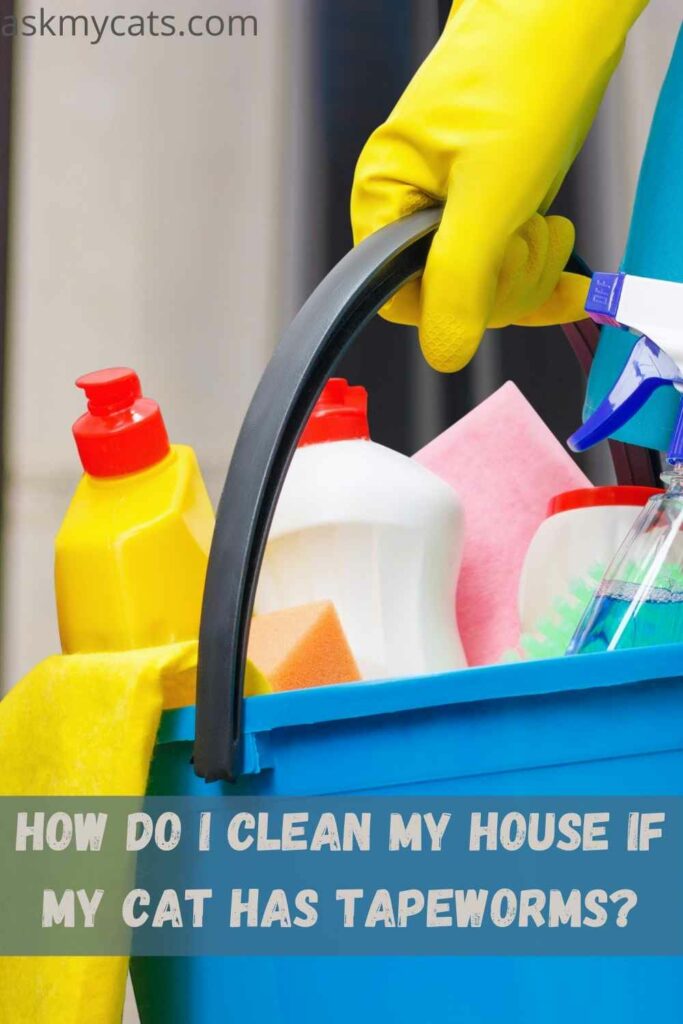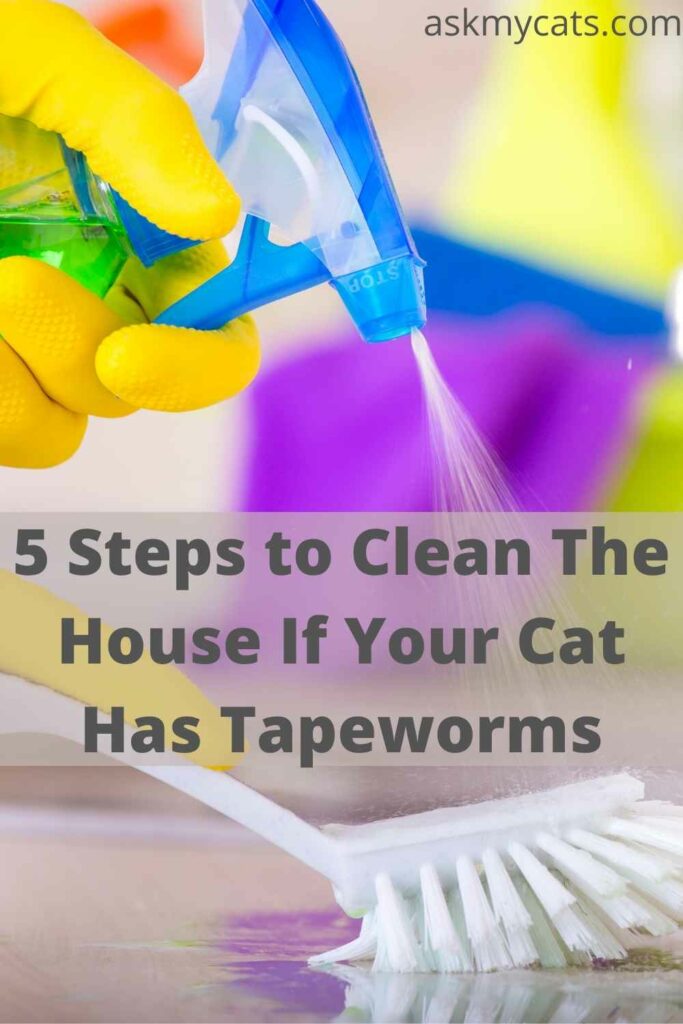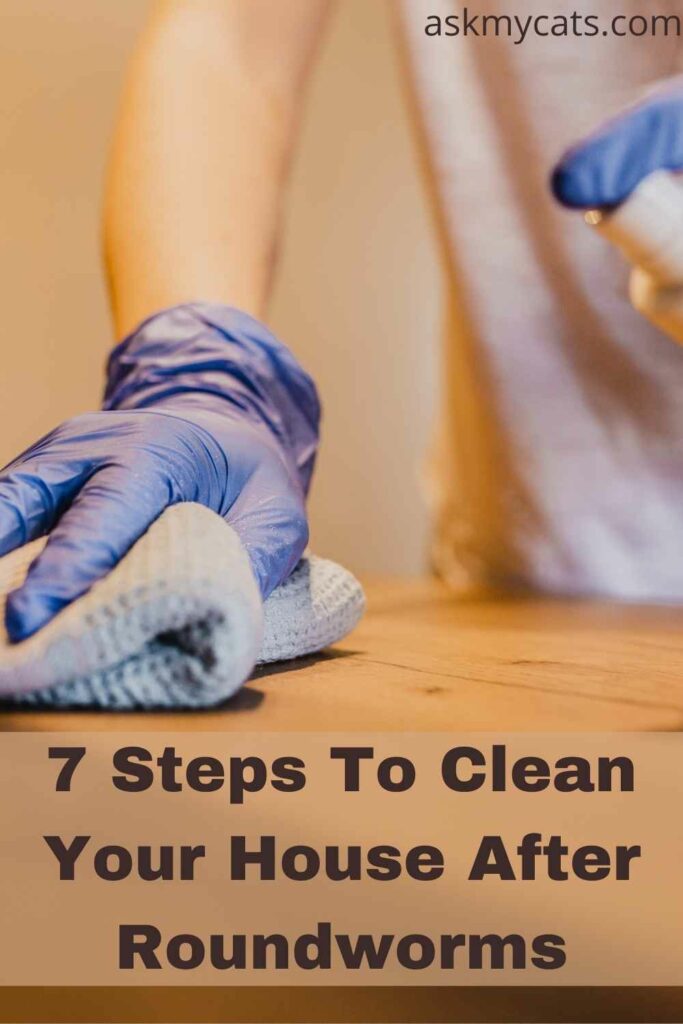Internal parasites such as worms are common in cats. When your pet goes outside, they’re usually picked up. While a worm infestation can be treated with the proper medication, the consequences can be rather unpleasant.
Worm-infested cats suffer from irritation in their sensitive hindquarters, resulting in dragging them on the floor. They’re also more likely to have bouts of sickness and diarrhea, which can make even litter-trained cats forget to use the litter box. When your cat has worms, cleaning up can be challenging since the lingering odors, and unsightly stains can be difficult to remove.
This article will teach you how to clean your house if your cat has worms and prevent them from reinfesting.


Give Your Cat the Perfect Day
Get the Free Ebook!
How do I Clean My House If My Cat Has Tapeworms?
The most effective way to clean your house if your cat has tapeworms is to cure your cat first and sanitize the entire home.

Tapeworms are long, flat worms with a large number of segments.
The tapeworm’s mature segments, which contain eggs, are discharged and passed in the feces.
These segments, which resemble rice grains, can be found in the cat’s hair near the anus, in the feces, and on the cat’s bed.
All tapeworms require an intermediate host to complete their life cycle.
The intermediate host must first ingest the eggs from the environment, and then the cat must eat the intermediate host to become infected.
Depending on the tapeworm type, different animals serve as intermediary hosts.
Dipylidium caninum and Taenia taeniaeformis are the most frequent tapeworms found in cats around the world.
Tapeworms are a common problem in flea-infested cats. Cats commonly acquire tapeworms after they eat fleas infected with tapeworm eggs.
The fleas may be mistakenly eaten by the cats when grooming or by licking flea-infested surfaces. The first step in controlling tapeworms is to eliminate the flea problem; nevertheless, you must still clean properly to ensure that tapeworm eggs are destroyed.
A few fleas ingesting leftover tapeworm eggs is all it takes to introduce a new parasite hazard to your cats.
You must like to read about are worms in cats deadly
5 Steps to Clean The House If Your Cat Has Tapeworms

Step 1: Remove The Source of Tapeworms
While the dewormer is being administered, you should totally de-flea your pet and home.
Getting rid of all fleas isn’t a guarantee that future infections won’t happen, but it’s a good start.
Ensure that your pet receives a thorough bath, as well as any flea medicine throughout this procedure.
Fleas are the most common means for tapeworms to spread in a home, but rats and other intermediates could also be to blame.
If you haven’t observed a flea infestation, rat traps may be used to ensure that all flea sources are eliminated.
Step 2: House Cleaning
The initial step is to clean up the area where the tapeworms may have originated, but depending on whether a human or animal was infected, you may need to do more cleaning.
Animals’ intestines are home to tapeworms. Generally, segments of them break off and travel out of the body with the feces.
These segments can cause infections on their own and can also lay eggs, resulting in new tapeworms. In any case, these must be cleaned and disposed of as quickly as possible.
If your pet has been diagnosed with tapeworms, you must clean every area that they may have touched, whether you saw it or not. Eggs of tapeworms can be carried not only in feces but also in paws and under claws.
Step 3: Always Clean The Litter
The first thing to think about is how to clean up after they poop—cleaning litter boxes as soon as possible after a bowel movement is recommended for cats. Before you throw away any bags, make sure they are tied off.
Step 4: Clean Solid Surfaces
While tapeworms themselves will struggle to survive on non-porous surfaces for lengthy periods of time, their eggs may survive for a long time in crevices and corners.
Bleach is an excellent disinfectant for tapeworms, but be cautious when using it on surfaces that may be sensitive to this caustic chemical.
Step 5: Clean The Outdoors
In addition to cleaning up the inside, you may want to clean the area where your cat spends the majority of its time outside.
Avoid using a hose or pressure washer with simply water to spray outside areas that may be infested with tapeworms or other parasites; this will likely spread the infestation rather than remove it.
Solid surfaces, such as concrete can be sprayed off with a bleach solution with a sprayer or power washer.
You must read about what to expect after deworming a cat
How Do I Clean My House After Roundworms?
You can clean your house after roundworms with bleach, cleaning rags, disposable gloves, rubber boots, detergent, salt, and vacuum cleaner.
The most prevalent intestinal parasite in cats is intestinal roundworms, which can be found in cats of all ages worldwide. Toxocara cati and Toxascaris leonina are the two most frequent roundworms found in cats.
These worms’ eggs are excreted in the feces and can survive for several years in the environment. These eggs have two means of infecting other cats.
First, a polluted environment may cause a cat to eat (ingest) eggs. Second, if another animal consumes the eggs (for example, a mouse or rat), the illness can be passed on to a cat if it preys on (and eats) the infected intermediary host.
Also, you might like to read about how much is it to deworm a cat
7 Steps To Clean Your House After Roundworms

Step 1: Cover Yourself Up
When cleaning up feces infested with roundworms, wear an N95-rated dust mask.
Disposable gloves, rubber boots, and full-body overalls protect your skin and clothing.
Step 2: Cleaning Up Feces
Remove cat feces from the litter box on a daily basis to keep it disinfected and prevent infection.
To disinfect the area, clean litter pans on a regular basis using a solution of chlorine bleach diluted in water.
If your pet defecates inside your home, clean it up right away.
Step 3: Spray
To avoid dust inhalation of roundworm eggs, lightly sprinkle any dried feces with water. This will also prevent the excrement and eggs from breaking.
Step 4: Remove Contaminated Insulation
If a raccoon or rodent defecates in an attic or other place with exposed insulation, cut away the contaminated insulation.
Dust inhalation can be avoided by misting the area first. Remove the insulation and dispose of the excrement in a heavy-duty garbage bag.
Step 5: Disinfect The Tools
Any tools used to remove feces, such as a scraper or shovel, should be boiled. One of the most efficient ways to disinfect equipment and eliminate roundworm eggs is to use boiling water.
Step 6: Clean Surfaces
To kill any existing roundworm eggs, pour boiling water on the floors and decks. When cleaning with boiling water, exercise caution.
Step 7: Kill The Remaining Worms
To get rid of roundworm eggs, steam clean your carpets. When the carpet is dry, move your pets to another room and sprinkle salt on it.
Allow for a few days of rest before vacuuming. Immediately after collection, throw away the waste from steam cleaning or vacuuming.
To kill any residual roundworm eggs, spray the dried carpet with isopropyl alcohol instead of salt after cleaning. Allow the alcohol to dry completely.
You might also like to read about home remedies for worms in cats
Can Cat Worms Live In Carpet?
Yes, cat worms can live on the carpet for several months if not disinfected.
Roundworms, tapeworms, hookworms, and whipworms are just some cat worms that can dwell in carpets. Worm eggs can also be found in carpets and can survive for longer periods of time.
Vacuum your carpets every day to keep worms at bay, and steam them to kill any eggs. If your cat scoots about on the carpet, it’s a symptom of worms.
Most parasitic worm species can survive in carpets to some extent. Some species can live pretty well and for a long period, while others do not.
Worms will not hatch or grow on carpet, although they may be able to survive there if, for example, a cat has defecated on the carpet and it contains worms.
You might find it interesting to know can i get worms from my cat sleeping in my bed
How long Can Roundworm Eggs Live In Carpet?
Roundworm eggs could live on the carpet for many months. The eggs excreted in the feces require one to three weeks to become infectious; nevertheless, these eggs can survive in the environment for months.
Roundworm eggs usually live in soil that has been contaminated by animal or human waste. They can, however, end up on your carpet in a variety of ways.
Your pet could be playing in the dirt outside and bringing in contaminated soil carrying roundworm eggs inside the house.
Alternatively, you could be doing yard work and getting eggs from the soil on your clothes, which could wind up on your carpet.
Because roundworm eggs cannot hatch and survive on your carpet, they require a host to hatch and survive. They are, however, resistant to a variety of environments and can survive on the carpet for months, if not years.
They can survive even longer in damp environments like soil. Adult roundworms would die if they got onto your carpet. The eggs would be your main worry.
How Long Do Tapeworm Eggs Live In Carpet?
Tapeworm Eggs could live on the carpet for upward of four months.
Tapeworm eggs can survive outside of cats for long periods of time due to their indirect life cycle and survival strategy. Adult tapeworms in the intestines of cats release reproductive segments through the anus.
The eggs must remain viable in the environment until their intermediary hosts, larval fleas, eat them.
While most tapeworm eggs live several months while waiting for intermediate hosts, scientists have discovered that some tapeworm eggs can last up to eight months.
You might also like to read about should i quarantine my cat with tapeworms
Can Cat Worms Live In Bedding?
Yes, Cat worms are capable of living in bedding as Sacs containing viable eggs are frequently found clinging to the hairs around a pet’s anus, in excrement, or in areas where the creature rests, such as a human bed.
Cats should be avoided to sleep in your bed if they are suffering from worms as they could get into your bedding and cause several unwanted problems.
Can Tapeworms Live On Furniture?
Yes, Tapeworms can survive on furniture are several months.
However, tapeworms are unable to grow and reproduce without a host; they can still survive on furniture waiting to enter a suitable host for several months.
When To Clean Litter Box After Deworming?
The Litter box should be cleaned each and every day after deworming.
Litter boxes should be cleaned regularly, ideally every day. This can also keep your cat pleased, preventing it from making messes elsewhere!
This should also help to stop the chances of your cat getting reinfected with worms after deworming.
How Do You Clean Litter Box After Deworming?
The litter box after deworming can be cleaned with bleach to facilitate the removal of eggs.
Stools should be scooped out of litterboxes on a daily basis. A bleach solution of one cup of chlorine bleach in one gallon of water can be used to remove eggs from litterboxes.
Because bleach is hazardous to cats, carefully rinse the litterbox to remove all bleach.
This bleach solution can also be used to treat surfaces that may be contaminated with worm eggs.
This solution makes it easier to rinse the eggs away, but it does not kill them. After handling litterbox material, always wash your hands.
Should I Change The Litter After Deworming?
Ideally, yes, you should change the litter box after deworming.
If you are sure that worms in your cats have been caused because of its litter box, then the litter box should be changed after deworming to eliminate any chances of the worms reflecting on your cat because of that.
Frequently Asked Questions
Can I Get Infected with my cat’s worms?
Ans. Yes, humans can get infected with cat worms, especially the old and the children that are present near the infected cat.
Should pest control be hired to eliminate the worms?
Ans. You can eliminate and sanitize your house free of worms quite effectively without the help of pest control if the proper steps are taken.
How often should I deworm my cat to keep her free of worms?
Ans. As cats are at risk of reinfection, keeping up with a regular worming routine at least once every three months will help keep your indoor cat healthy and free of intestinal parasites.
Final Words
Worms aren’t particularly deadly to cats, but they can cause a slew of issues for them and their owners.
We must ensure that these worms do not reinfect our cats or spread from our cats to our families, and the easiest way to do so is to thoroughly clean the house after the worms have been removed.

I have a steamer (hand-held) that I could use to disinfect my carpets and furniture. How long does an area need to have steam directed at it for it to be effective?
Having your steamer directed to an object for 10-15 mins would be enough to disinfect it.